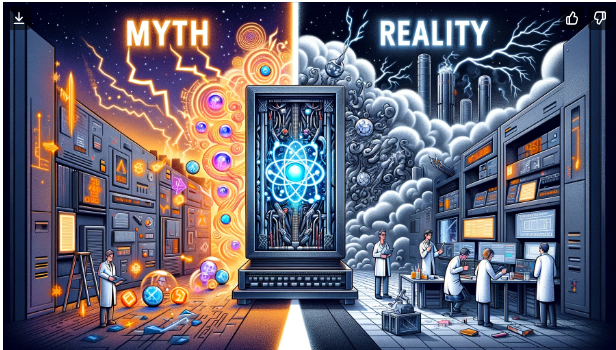|
Quantum Myth
I know Quantum Computing would be one of the hottest topics and all of you (reading this note) are so interested in the technology, but there are also myths and misconceptions as in many other new / fancy technologies. Sometimes it is good to look into these myths /misconceptions and understand how to debunk because it would give us more insights like accurately assessing the current state and future potential of quantum computing..

Myth 1: Quantum Computers Will Replace Classical Computers
Debunking: Quantum computers are not meant to replace classical computers but to complement them. While quantum computing excels at solving certain types of problems (like factoring large numbers, simulating quantum systems, and optimizing complex systems), classical computers will remain superior for everyday tasks such as browsing the web, text processing, and most current business computing needs. Quantum computers add a new tool for tackling problems that are currently intractable for classical
systems.
Myth 2: Quantum Computing Will Make All Encryption Obsolete
Debunking: It's true that quantum computers could break many current encryption schemes, such as RSA and ECC, by efficiently solving problems like integer factorization and discrete logarithms (thanks to algorithms like Shor's algorithm). However, the field of quantum-resistant cryptography is actively developing new algorithms that are believed to be secure against quantum attacks. Moreover, quantum key distribution (QKD) offers a method for secure communication that is proven to be secure
by the laws of quantum mechanics.
Myth 3: Quantum Computers Are Just Faster Versions of Classical Computers
Debunking:Quantum computers are not simply faster versions of classical computers; they operate on a completely different principle. Quantum computing takes advantage of quantum bits (qubits), which can exist in a state of superposition and entanglement, allowing them to process a vast amount of possibilities simultaneously. However, this doesn't mean they perform all computations faster; their advantage is highly dependent on the type of problem being solved.
Myth 4: Quantum Computers Can Solve Any Problem Instantaneously
Debunking: While quantum computers have the potential to solve certain types of problems much faster than classical computers, they are not magical devices that can solve any problem instantaneously. Their performance advantage is highly specific to tasks that can leverage quantum parallelism, such as quantum simulation, certain optimization problems, and specific algorithms designed for quantum computing. Many problems do not see a quantum speedup and still require significant time and resources
to solve.
Myth 5: Quantum Computing Is Already Here and Fully Operational
Debunking: Although there have been significant advancements in quantum computing, and some companies offer cloud-based access to quantum processors, we are still in the early stages of quantum technology, often referred to as the "Noisy Intermediate-Scale Quantum" (NISQ) era. Current quantum computers have a limited number of qubits and are prone to errors and decoherence, making them unsuitable for most practical applications envisioned for fully operational quantum computers. The
field is progressing rapidly, but there's still a long way to go before quantum computing becomes widely accessible and practical for everyday use.
Myth 6: Quantum Computing is Just Theoretical and Not Practical
Debunking: Although quantum computing began as a theoretical field, it has made significant progress towards practical implementation. Companies and research institutions have built quantum processors with an increasing number of qubits, and some quantum algorithms have been experimentally demonstrated. The field is moving from purely theoretical research to practical experiments and applications.
|
